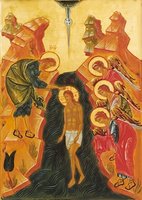 The First Luminous Mystery: The Baptism of the Lord
The First Luminous Mystery: The Baptism of the LordOur Lord, though innocent, takes on our sins as He enters the water of Jordan and is baptized by John. His mission of our salvation is blessed by the Father's praise and the Spirit's descent. Ask Our Lady to help you pray this decade, pondering the light that comes from submission to the will of God.
--from
Praying the Rosary: With the Joyful, Luminous, Sorrowful, and & Mysteries by Michael Dubruiel and Amy Welborn.
Repent or Perish Luke 13:3
"I must decrease, He must increase" St. John the Baptist told his disciples after his encounter with Christ. Our submission to the will of God begins with our submission to Christ--our own dying with Him and rising anew in Him at our Baptism. But the act of submission needs to happen at every moment of the day. Every second brings with it a moment of prayer--will I submit to my will against His or will I bow down to His authority and choose Him. The world may cry out "I've got to be me," but the servant of God cries out "I've got to be His." St. Paul reiterates this when he declares, "I live, no not I, but Christ."
We fear this repentance. We secretly grieve that we won't be ourselves if we submit. Something within at a very early age urges us to resist (original sin) and it does not go away quietly. So many of us are slowly perishing, spending our demise judging others, living in darkness.
The biblical notion of this state of humanity is that of something that is lost. Will we continue to cling on to the lost being or will we allow ourselves to be found by Christ--at this moment and at every moment walking in His light and overcoming the darkness of the lost?
Michael Dubruiel

